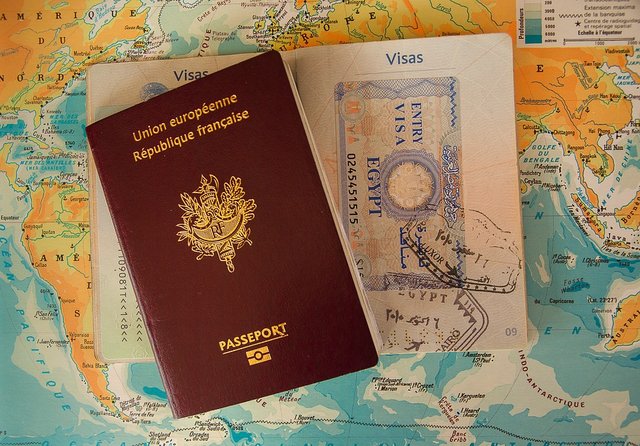Welcome to the Age of Decentralization, Part 2: Here, Have Some Predictions!

At a time when everything from transportation to warfare is being decentralized, what changes can we expect in the near future?
As promised yesterday, below is a list of my predictions for how disruption and decentralization will reshape our world in the next ten to twenty years. Keep in mind, I'm not a psychic. I'm just a person who is fascinated with these trends and trying to keep my finger on the pulse of the future. These are my "best guesses" for where we are heading, given the information currently available to me and the trends I've picked up on over the past few years.
(This is Part 2 of my Welcome to the Age of Decentralization series. You can read the first part here: Welcome to the Age of Decentralization, Part 1)
Banking and Finance

The crypto revolution will continue to surge and grow, and major banks will attempt to stop or control it in three ways: by lobbying governments to pass laws against it, by using their large fiat reserves to manipulate certain coins, and by producing their own crypto products (like Ripple) to bank-ify digital currencies. Central banks will issue cryptocurrencies, but these bankcoins will be inflationary; antithetical to the revolutionary spirit of crypto. We will start to see entire countries and regions abandon their crappy central bank-issued fiat in favor of the fiscal autonomy afforded them by the use of decentralized cryptocurrencies. Within two decades, most central banks will have either perished or changed to the point they are unrecognizable by today's standards.
Loans and finance will undergo a decentralization makeover, as more and more loan and investment seekers utilize services like Kickstarter and Kiva to secure funding for everything from obtaining a degree to starting a business. In the near future, we can expect to see such services cropping up that are entirely blockchain based, and use cryptocurrencies as funding. This is going to cause a lot of headaches for the financial industry, in the form of losses.
Corporations

Entrenched corporations will try to fight the decentralization trend by continuing to do what they do best: merge and consolidate. This will probably not bode well for them in the long term. No matter how wealthy and powerful a company gets, it is impossible to fight small economic battles on a million fronts. The decentralized competition will slowly suck away the profits, and eventually the life, of many of these behemoths. The traditional companies that remain will be stronger and more nimble due to the adaptations they will have made to the new, decentralized markets.
(For an example of how this may already be playing out, see @careywedler's post, Split From Paypal Will Enable Ebay to Begin Accepting Bitcoin, Cryptocurrencies.)
Politics and Governance

The next ten years will bring more Brexit-style retreats as countries pull out of regional governments, states and provinces secede from countries, and cities break away to form city-states. The near future of governance is smaller and more local. Less like a strong empire and more like a friendly city council. People all over the planet have had it up to their noses with foreign rule, out-of-touch politicians, and impenetrable bureaucracy.
The next decade will bring with it the first, exciting experiments in full and quasi-statelessness. Expect to see charter cities, seasteads, autonomous zones, and possibly even earth-orbiting spacestead projects launched in the near future.
By the year 2040, there will be no more European Union, and possibly no more United States of America--or at least a much smaller one. The United Nations may also cease to exist, or may evolve into something different. China's government will still hold onto its vast landmass and population, however. This will make things interesting for international diplomacy in the future.
Consumer Goods

Many of the plastic consumer goods we currently enjoy purchasing at Walmart will instead be 3D printed at home, or at the local 3D printing shop. Specialty stores will have their own 3D printing stations with specialty items that they print for their customers. Mechanics and repairmen will 3D print hard-to-find parts on the spot.
Items like computers, microwaves, and TVs will still be mass-produced, but within ten years most manufacturing will have moved from China and India to Africa, SE Asia, and Central America. Within twenty years, most manufacturing will employ robots, rather than human workers. At the same time, robot helpers will become affordable for the middle class, and businesses will start to spring up where the owner does very little of the actual work, and employs few human workers, having instead programmed androids to do the labor.
We will see a rise in the community based sharing/renting of items that are high-cost/low-use, like power tools or specialty kitchen items.
Autonomous cars will be popular, along with autonomous tractor trailers, lawnmowers, tractors, and boats. You might buy ice cream from an autonomous ice cream truck, or have an autonomous lawn service come to cut your grass once a week.
Borders and Immigration

Borders are, and have always been, a contentious subject in many places around the world. I don't think that's going to end any time soon, but I do think that the decentralization trend will change the way we think about governance and political geography, and thereby impact how borders and immigration will work in the future. As I already stated above, I believe that the trend in governance will be moving towards smaller, more localized states and city states over the next couple of decades, with perhaps a few stateless zones thrown in the mix. As a result of these developments, we might expect that travel between "states" will become freer--just as an example, how much sense would it make to police all traffic coming from Los Angeles to San Francisco? It would likely be an unnecessary and not very cost-effective effort.
It will be even more interesting to watch what happens with immigration into the stateless zones. I imagine that the way immigration is handled might differ between a private city on the coast of Guatemala and an autonomous zone in Eastern Europe, and it would probably end up being a matter of cultural preference. It would be nice to see places opening up to free immigration from all parts of the world, like the United States did back in the day.
But there will still be areas where borders are closely guarded and immigration is highly policed. Such situations will tend to arise, as they always have, in rich places that neighbor poor places, or in areas of conflict.
That's it for today.
I had planned to get a lot more predictions packed into this post, but the hour grows late and the post grows long. So, surprise! This series just turned into a three-parter! Check back tomorrow for my predictions on how the Age of Decentralization will impact Education, Healthcare, Lifestyles, and more!
All photos in this post were snagged off of Pixabay.com and used under a Creative Commons license.

Hi, I'm Starr!

Really love these predictions, and there is a ton of work that needs to happen before we get there : )
True, but the work is already underway!
That is so true, the work has already begun !
I enjoyed you predictions and actually agree with many of them. You may enjoy a book call the 500 Year Delta written back in 1997.

They speak of three dominant forces they call Convergence of Change...
"- The shift from reason-based to chaos-based logic
-The splintering of social, political, and economic organization
-The collapse of producer-controlled consumer markets"
But more relevant to your discussion they examine "An expansion of perspective as boarders disappear - between nations, between peoples, between work and leisure - and governments fade into the background with them."
Their following words somehow seem relevant to Steemit.
"The growth in the economic value of information sharing, the decline in the value of information with withholding, and the rise in the value of the intellectual property people claim for themselves."
The following excerpt is the core of their study.
"This is the world we have arrived at today: one in which the principles driving change are no longer reason but chaos, no longer causal relationships but disharmonious conjunctions. And yet, because we inevitably remain living in the past while we are carried into the future, we keep using reasonable explanation to account for unreasonable feelings and actions. That is the modern condition, a source of our contemporary, pervasive anxiety. But it is only one source, because as we drive toward the century's end, drive toward the millennium, reason is only one of three great rivers converging at the same delta."
"Simultaneously, another five-hundred year experiment - this one with the creation of consumer markets as the fundamental organizing principle of economics - is coming to and end. At the same time, a two-thousand-year-old experiment in social organization- a model of the family and society as old as Christianity- is racing to its close. And like the river of reason, both these rivers, too, flow at flood tide. The delta that we face is composed of the commingled silt of all three forces, and it is this joined loss of social, economic, political and logical certainty that fully feeds the beast of anxiety - that has us stark awake in our beds at three in the morning, toting up the balance sheet of our lives. If the rivers that have formed the delta are all the same color when the converge, they will fuse and produce a future of enormous energy. If they are not, they cannot be in the same place and social dislocation at an unprecedented scale will follow. Either way, we cannot turn back. We have no choice but to move forward with the flow."
As I periodically refer to this text I am always impressed with how many of their predictions still hold 11 years later.
That sounds like a captivating book. I'm definitely going to check it out. Thanks!
Hey leslie, I have just started reading your piece but unfortunately I am literally on my way out of the door. But I just wanted to say that I have only been on Steemit for about a month, so have by no means exhausted the possibilities of what is on offer, but it is lovely to read something so well thought out and written in a concise and accessible style. As soon return home I will find your piece from yesterday and read part 1 before I conclude this piece. Speak soon and thanks again for taking the obvious time that you have and not simply throwing words at the screen. Cheers J
Aw, thanks for the kind words, @jeffbowen! I do put effort into my Steemit posts, so it's good to know that it's appreciated. :)
Welcome to Steemit, btw!
Great piece. Couldn't argue with a word of it.
Next big thing will be home cooked, home delivered meals.
You know, I have really been looking forward to that particular development. Of course, it's already a reality outside of the USSA.
Not much here in Australia, at least that I've heard of.
There's one site which covers Sydney but thats a little more catering-esque.
Someone comes to your house, cooks there and serves it to you.
I was thinking more in the realm of so-called "third world" countries, where restaurant licensing and sanitation inspections aren't a thing.
I've looked into it and it is expensive.
I liked you post, it's very interesting how we see the future... and kind of prompted me to write this one....
https://steemit.com/blog/@lucylin/let-s-not-get-blinded-the-elephant-isn-t-going-away-yet-part-1
I was recently thinking about the actual implementation of all these technologies that open new ways to shape the future, and how they also enhance the understanding of everything like big-scale economy systems suddenly made accesible to everybody, stuff like immigration and borders could also be re-structured to fit this kind of bigger scale mindset... cities > countries > continents > planets, and so on...
Yes... you are right... we are heading to one direction that could be bumpy and bloody. Since all corrupt gov. will surely stop it at all cause. However, the revolution of blockchan and decentralization is unstopable, they also tried all there might to halt it or slow it down as you mention on this article. Honestly I am very excited for the next part of these post. Looking forward for a good read ahead.
Thanks to your inspiring post I had the thought right now that decentralization is the answer to what we call globalization. The cool thing about that: there hasn't to be a contradiction in both things. Growing together by decentralization... to me that sounds like a goody! I wish everybody and especially governments could see it that way.
I totally agree with you. In a way, decentralization is the other (better) path to globalization. There are two things that people mean when they use the term "globalization": a consolidation of power to a smaller and smaller group of elites, OR the increase in social and economic connections among individuals around the world. One of those is bad, and one is good. Decentralization is the way to the good kind of globalization, while centralization is the way to the bad kind.
Wow! I wouldn't have been able to put that in words like that! Great definition!
fascinating predictions. sci fi becomes reality. any thoughts on the possibility of the globalists getting in the way?
I think the globalists will do what they always have done, and it will continue not really working, and they will continue thinking it's totally working, until they wake up one day and realize they were wrong and their schemes have failed. The globalist agenda is all about control. They want worldwide control of economy, of government, of society, and they want all that control neatly consolidated into the hands of a few chosen elites. In the past, humans have been easy to control for a time. You can grind a society under your boot and keep it there maybe for a generation or three. But eventually, a controlled society succumbs to the problems caused by its own rigidity. Revolution is inevitable. What has never been done yet is consolidating power over all nations. I posit that the reason it has never been done is because it can not be done. There are too many factors, too many variables, too many differing cultures and values and needs and desires to herd them all into the same obedient underclass. And now that technologies like blockchain are here, I think it'll be harder than ever for existing powers that be to maintain control over the peoples and landmasses that they already have.
Let's hope you're right. Control on large scale has happened before but as you say, not at the world level. The current situation is more precarious because of technology, especially if there are things out there that people aren't aware of. The things we know of are bad enough..It scares me to see certain events coordinated at the global level, that is not an easy task. There must be more than what we see.
I liked a lot of your predictions, others were more dystopic.
Thanks for commenting. Just wondering--which ones did you find to be dystopic?
The part where America is gone by 2040, I like America.
Yeah, I like America, too. It's my home! But my prediction is not that America will go away, just that the federal government of the United States might go away, or that the country might break up into smaller states or regions. Even if that happens, I think America will still probably retain most of the attributes that makes it such a likeable place.
as much as we hear people in CA or other states occasionally call for secession at the end of the day that would be bad for business.